|
State & Regional
Dialogue on
“Creative
Engagement of Civil Society in Strengthening Secularism”
Over the past few months,
violence has shown its ugly face on the citizens of India
terrorising people, threatening people, killing innocent people,
attacking religious institutions, and the list goes on. There
has been clash among communities either in the name of ethnicity
or religion and the ideology of religious fundamentalism; the
principles of conflict and the concept of hatred have been
reaping greater fruits in this whole saga of violence. Innocent
victims had to pay the price in this whole episode. What Samuel
Huntington has predicted the ‘Clash of Civilisations’, in a way
is taking its deep roots in India with the clash of faiths,
clash of interests and clash of cultures as its manifestation.
Nearly ten people died in
the communal violence in a village Bhainsa, Adilabad district,
Andhra Pradesh during last week, the victims had been from the
Muslim minority community. Nearly fifty-one people died in the
violence in Assam during last few weeks in Udalguri and Darrang
districts in Assam dodged by clashes between Bodos and
Bangladeshi migrants, where the victims are the Tribals. The
violent episode in Orissa, which has been unabated for the last
seven weeks, though there has been an uneasy calmness during
last one week, resulted in the killings of nearly fifty people,
the majority happen to be Dalit Christians. Besides these major
incidents, there have been reported communal violence in the
states of Karnataka, Madhya Pradesh, Chattisgarh, Gujarat etc.
Incidents of terrorism and bomb blasts continue to rock both the
urban and the rural India, violence has crept into all corners
of the Indian society.
Violence on any community
is not a mere attack on that community, rather they are
violation of human rights and a breach of citizenship guaranteed
by the Constitution of India. Even the National Integration
Council, which met on the 13th October 2008, under the auspices
of the Ministry of Home affairs in New Delhi discussed and
interacted on communal violence, and observed that the unity
among different cultures in India has been tarnished by these
acts of violence. On the whole, these violent attacks on people
have loosened the secular fabric of India, which has so far
sustained India towards unity in diversity. Violence in the name
of religion and caste is a blatant blot on the secular and
democratic ethos of our country, and with these inhuman
activities continuing, secularism in India is at stake.
In this scenario, several
pertinent issues come to the fore, to be discussed and
dialogued. Branding communities, terrorism, violence on
religious minorities, religious fundamentalism, fanaticism,
fascism, forced conversions, violations of human rights,
violation of Constitutional rights etc. all added in fading our
rich secular heritage in India.
In light of the on going
violence in India, and in the backdrop of the above said issues,
the role of civil society in promoting the values of secularism
and in taking forward the message of peace among communities
comes immanent. Time and again, it has been emphasised by the
responsible citizens of India that the civil society needs to
vigilant in building peace and harmony in times of crisis and
build solidarity to communities that have been affected. What is
the role of the civil society in strengthening Secularism today?
What are the methods for creative engagement of the civil
society towards that? What strategies should the civil society
needs to employ in establishing peace and harmony in times of
crisis and conflict? What is the role of dialogue in the context
of violence? How can the civil society exert pressure on the
Governments in safeguarding the citizens of India? These are
some of the pertinent questions that need to be addressed by the
citizens of India. Civil society means all the responsible
citizens, irrespective of their religion, region, and
affirmations, committed for the values of secularism and
democracy.
Therefore, in order to
delve on these important questions for our times, the National
Council of Churches in India (NCCI) Catholic Bishop Conference
in India (CBCI) in collaboration with Inter-Faith Coalition on
Peace (ICP) is organising a three + one phase dialogue on
secularism.
Objectives
-
To engage as civil
society in strengthening secularism in the context of
violence.
-
To address issues
that counters the texture of secularism and human rights in
India.
-
To bring out
strategies that the civil society can employ in bringing
peace and harmony among communities.
-
To exert pressure
on the governments in safeguarding the citizens of India.
-
To sensitise the
citizens to be vigilant in times of conflict and to become
ambassadors of conflict resolution mechanisms in their
localities.
-
To give a call to
the nation on the strength of civil society and its role in
peace building.
Phase I
is a Dialogue
on “Creative Engagement of Civil Society in Strengthening
Secularism” where Interfaith delegation representing all India
level talks with Bajrang Dal at Jeypore (Orissa) to be held on
the 17 November 2008 and on the 19 November Interfaith faith
delegation meets the Vishwa Hindu Parishad at Bholangir (Orissa)
and 26 & 27 meeting with Christian community leaders at
Khandamal.
Methodology
A group of 30 responsible
citizens from all faiths of India will be called for the
localised Dialogue with Bajrang Dal, Vishwa Hindu
Parishad, and with affected Christian community of Orissa. Out
of which, 10 eminent social activists & human rights activists,
who are part of the civil society shall speak on the occasion
and set a tone for the creative engagement of the civil society
in strengthening secularism in India. There will be an honest
dialogue among citizens on the issues confronting secularism. A
document on strengthening secularism shall be evolved from the
dialogue, which will be circulated to all the civil society
organisations, agencies and institutions.
Phase II
is a State level Dialogue to be held on 6th December
2008 at Bhubaneshwar, Orissa. To safeguard the values of
secularism and democracy are part and parcel of the mission of
the interfaith community, and therefore is interested in
bringing together the citizens of India for a dialogue on
secularism. The impact of such dialogues will be to
inspire the citizens of India to be harbingers of peace and
harmony, and to resist and condemn all forms of violence that
blots the secular values.
Methodology
Nearly 100 people from
all faiths, ideologies shall attend the dialogue on secularism.
Out of which, 10 eminent social activists, human rights
activists, religious leaders shall speak on the occasion. The
national document on secularism shall also be an objective paper
for the discussion and direction in this regional dialogue.
Phase III
Symbolic action during Christmas
where all faith people can jointly celebrate Christmas.
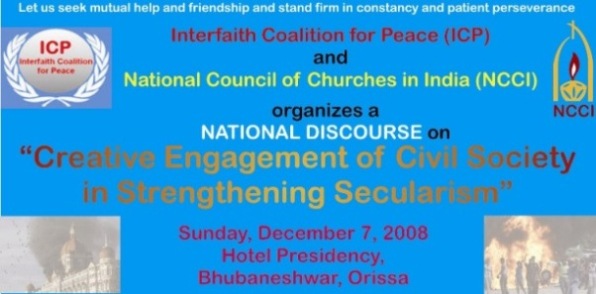
Summary
Report
from meeting
on the
Peace
Mission to Orissa
ICP Office,
November 27, 2008
1. Strategic
issues to focus on for the peace delegation going to Orissa.
The context in
Orissa is complex. The reasons for the conflict are both long term and
resent. Some of the deep rooted tensions are connected to issues of identity
and cast, and will demand a more long term peace process to be dealt with.
ICP will now give priority to issues that can have a more immediate effect
on the conflict to avoid more violence and with a focus on establishing a
platform for further peace building. ICP will coordinate the visit of a
peace delegation to the most affected districts in Orissa to address the
issues of tension and contribute to calm and conflict resolution in the
area.
The Peace
Delegation of 15 persons will consist of religious leaders representing the
Hindu-, Protestant-, Catholic-, and Muslim communities. Local elders and
religious leaders will join them in Orissa. At least four women will be part
of the delegation. They will during the period of December 1st to
7th
visit Kandhmal, Phulbani, Jalpiguri, G. Udiagiri, the most affected
districts, and the state capital of Orissa Bhubaneswar. The delegation will
try to meet with all the relevant actors and affected communities in order
to try to bring the parties together on some key issues.
Main
objectives:
- Facilitate
the issuing of a statement by all involved parties to stop all violent
activities and commit themselves for jointly working for lasting peace in
the state.
-
Facilitate and mediate an
agreement by all parties on key issues for addressing the situation and
follow up.
-
Establishment of peace
committees in the most affected areas.
-
Provision of humanitarian
assistance to all, not only for selected communities.
-
The establishment of some
basis for efforts leading to lasting peace.
-
Provide the relevant
actors in the state with recommendations to secure a good process, including
the government.
Key issues
the delegation will work on:
1. Establish
agreement among the parties on the fact that the Hindu leader, Swami
Lexmanananda Saraswati , was killed by a political Maoist group, and not by
some activists representing the Christian community in Orissa. This is a
fact that has been established by the government through police
investigation.
a. By
agreeing on this issue, some of the rationale for continued attacks on
Christians will be removed.
2. Meet
with the affected communities on different levels to further develop the
understanding of the conflict situation.
a.
Efforts will be made to
secure that also women will be able to tell their stories, including the
perspective of gender based violence, and make sure their suggestions for
how to address the situation and secure lasting peace will be taken into
account.
3. All
parties should agree that formal investigations and establishing justice is
to be handled by proper government authorities and not by common people
taking violent action on their own.
4. The
different faith groups should develop and agree on a common code of conduct
for conversion that will not reduce the human dignity of any person and
faith community or humiliate people of other faiths.
a.
This agreement should be
issued on a jointly signed statement.
5. All
parties should agree to avoid derogatory and militant language in general,
used to humiliate and wrongly portrait each other.
6. All
parties should agree that humanitarian assistance should be given on bases
of need and not be conditioned to what faith-community people belong to.
a. The
delegation will try to meet with all the main organizations working with
humanitarian assistance to convince them to establish a common coordination
and to abide to the principal that humanitarian assistance should be given
based on need and not be made conditional to people’s spiritual or political
affiliation.
b. The
delegation will try to convince the humanitarian actors to apply a holistic
approach, and be sensitive to the context of conflict, avoiding that the
humanitarian assistance exacerbates tension and rather contributes to
providing stability and a conducive environment for peace making. The
delegation will have members that are trained in conflict sensitive
programming, the “Do No Harm” tool, and will offer training for the
humanitarian actors if there is a need.
7. The
delegation will ask the parties to agree on setting up peace committees on
district level in all the affected areas. The peace committees will be
linked to the traditional Panjhait – existing village council (e.g. village
council for 5 to 8 villages).
a. The
delegation will try to see to that these committees are put together while
they are around. The committees will be interfaith, both men and women will
be represented and efforts will be made so the general population will feel
that they are fairly represented.
b. The
peace committees will intervene if new tension is developing, and will be a
place where people can come and share their concerns and complaints.
c. The
peace committees will monitor the security situation and, if necessary,
appeal for extra measures to be taken through the Panjhait structure.
d. The
peace committees will advice humanitarian organizations to secure that
humanitarian assistance is being distributed in accordance with the
principal above, and will be monitoring that.
e. The
peace committees will also be monitoring that whatever the parties and the
interfaith peace delegation agree on is implemented accordingly.
. The
delegation will ask the state government to make sure that sufficient
security is in place so that internally displaced refugees will feel
confident moving back.
a. The
delegation will suggest that the Commission for Minorities, or some relevant
body outside of the state, monitor whether sufficient security is in place
or not before the displaced population moves back.
9. The
delegation will try to have all parties to agree on implementing a joint
peace conference in Bhubaneswar on t7th, where the aim is to
issue a common declaration approved and signed by all the relevant
conflicting parties reflecting the issues above for the wider community, and
hopefully paving the way for resettlement of the displaced people.
ICP will commit
to preparing a capacity building program for the Peace Committees to be
implemented in 2009 to strengthen the capacity and role of these committees.
ICP will make
sure that proper documentation of the peace mission will be secured so that
the lessons learnt can be shared.
-
end
-
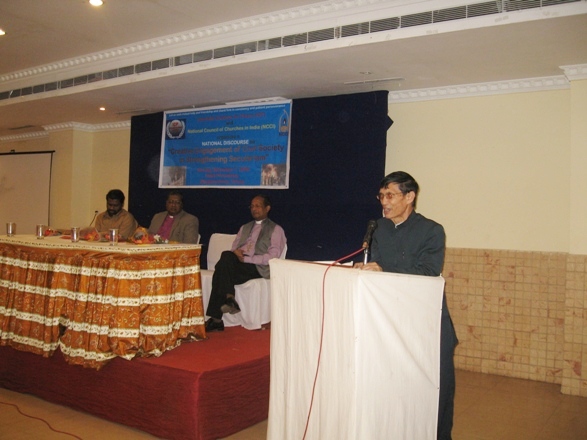
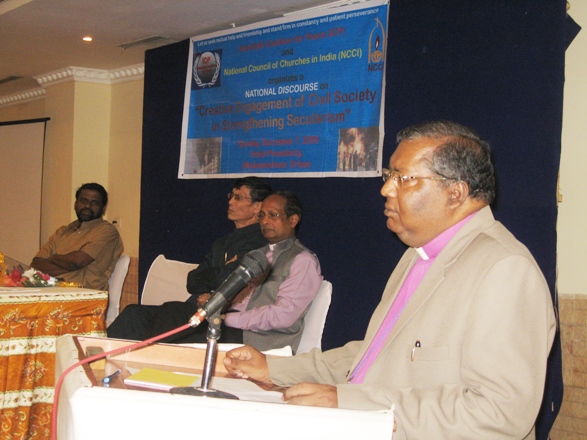
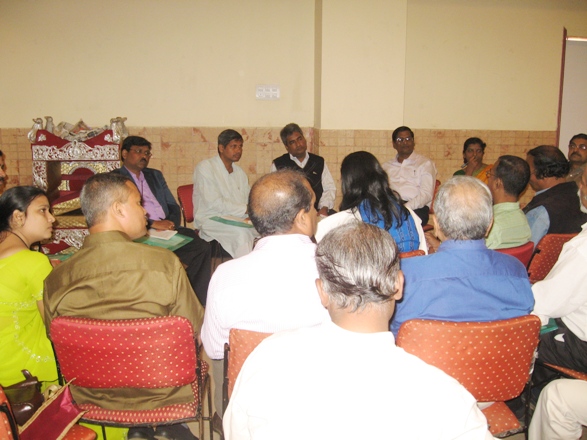
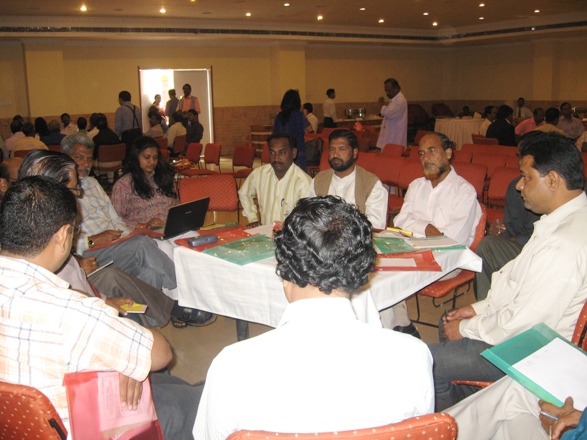
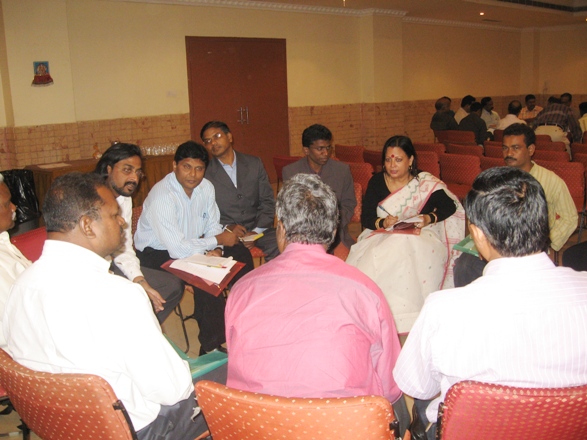
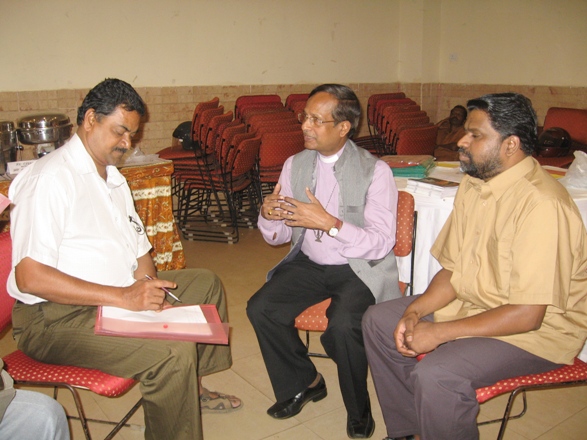
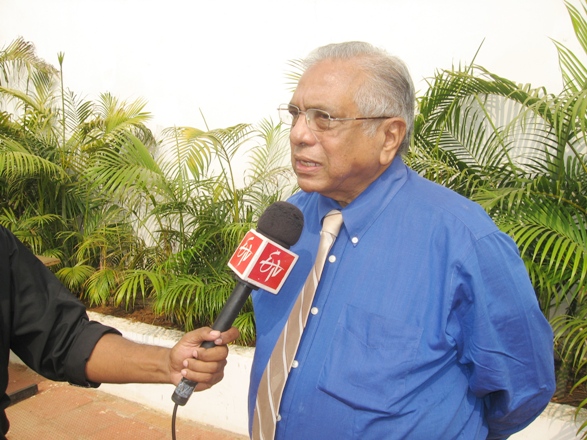
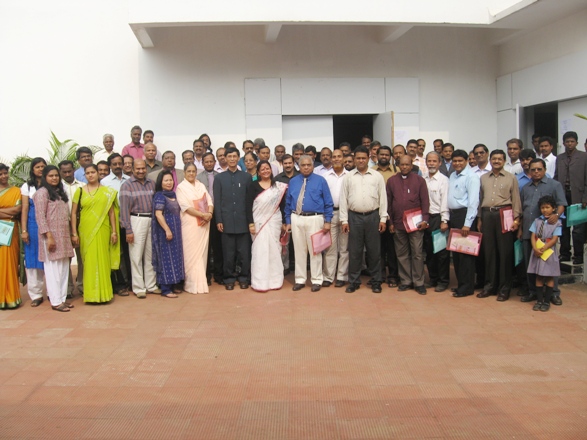 |